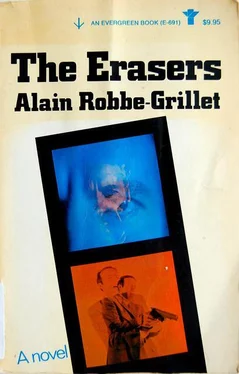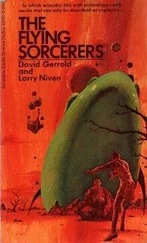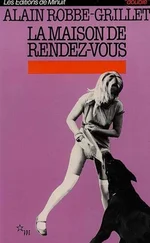Alain Robbe-Grillet - The Erasers
Здесь есть возможность читать онлайн «Alain Robbe-Grillet - The Erasers» весь текст электронной книги совершенно бесплатно (целиком полную версию без сокращений). В некоторых случаях можно слушать аудио, скачать через торрент в формате fb2 и присутствует краткое содержание. Жанр: Криминальный детектив, на английском языке. Описание произведения, (предисловие) а так же отзывы посетителей доступны на портале библиотеки ЛибКат.
- Название:The Erasers
- Автор:
- Жанр:
- Год:неизвестен
- ISBN:нет данных
- Рейтинг книги:4 / 5. Голосов: 1
-
Избранное:Добавить в избранное
- Отзывы:
-
Ваша оценка:
- 80
- 1
- 2
- 3
- 4
- 5
The Erasers: краткое содержание, описание и аннотация
Предлагаем к чтению аннотацию, описание, краткое содержание или предисловие (зависит от того, что написал сам автор книги «The Erasers»). Если вы не нашли необходимую информацию о книге — напишите в комментариях, мы постараемся отыскать её.
The Erasers — читать онлайн бесплатно полную книгу (весь текст) целиком
Ниже представлен текст книги, разбитый по страницам. Система сохранения места последней прочитанной страницы, позволяет с удобством читать онлайн бесплатно книгу «The Erasers», без необходимости каждый раз заново искать на чём Вы остановились. Поставьте закладку, и сможете в любой момент перейти на страницу, на которой закончили чтение.
Интервал:
Закладка:
“Don’t park here,” he tells the driver. “I prefer not to have my visit noticed. Drive around, or park a few hundred yards away. And be back in exactly half an hour.”
“Yes, Monsieur,” the man says. “Do you want me to park the car and come with you?”
“There’s no need for that, thank you.”
Dupont gets out and walks quickly toward the gate. He hears the ambulance drive away. The man is not a “bodyguard”: he would have insisted on following Dupont. His looks had fooled the professor, who now smiles at his own romanticism. The very existence of these famous guards is, moreover, quite uncertain.
The gate is not closed. The lock has been out of order for a long time, the key does not even turn in it, which does not prevent the latch from closing. Old Anna is growing quite careless-unless some child was playing here and opened the gate after he left-a child or a prowler. Dupont climbs the four steps up to the door, to make sure that the front door, in any case, is actually locked; he turns the heavy brass doorknob and pushes hard, adding the pressure of his shoulder, for he knows that the hinges are very stiff; since he wants to be sure of the result and mistrusts the unaccustomed movements imposed by his single good arm, he repeats the effort two or three times, yet without daring to make too much noise. But the big door is locked tight.
He has given Marchat the keys to this door, and the businessman has left without even bothering to return them. Dupont has only the key to the little glass door left; he must therefore walk around the house to the back. Under his feet, the gravel crunches faintly in the silence of the night. It was a mistake to count on that coward Marchat. He has wasted the whole afternoon waiting for him; finally he telephoned his house, but there was no one there; at quarter to seven he finally received a message that came from somewhere: Marchat was sorry, he had had to leave town on urgent business. That was a lie, of course. It was fear that had made him run away.
Mechanically, Dupont has turned the doorknob of the little door. The latter opens without resistance. It was not locked.
The house is dark and silent.
The professor takes off his glasses, which are bothering him. He has stopped in the vestibule and tries to figure out the situation…Did Marchat come after all? No, since it was the front door keys that had been given to him. And old Anna, if she hadn’t left, would be in the kitchen at this hour…that’s not certain…in any case, she would have left a light on in the hall or on the stairs…
Dupont opens the kitchen door. No one there. He presses the light button. Everything is put away, as in a house where no one lives any longer. And all the shutters are closed. Dupont turns on the light in the hall. As he passes he opens the living room and dining room doors. No one, of course. He starts up the stairs. Perhaps Anna forgot to lock the little door when she was leaving. She has been growing absent-minded the last few months.
On the second floor, he goes to the housekeeper’s room. It is obvious that the room has been put in order for a long absence.
Having reached his study door, the professor holds his breath. Last night, the murderer was waiting for him there.
Yes, but last night the little door was open: the man didn’t need a key to get in; tonight he would have had to force the lock, and Dupont noticed nothing of the kind. And if the man found the door open this time too, it is because old Anna had not locked it, in any case…It is impossible to reassure himself with arguments of this kind; with a bunch of skeleton keys, a specialist can easily open all ordinary locks. Someone has made his way into the house and is waiting, in the study, in the same place as yesterday, to finish the job.
Objectively, there is no reason to suppose this is not true. The professor is not easily frightened; nevertheless, at this moment he regrets that he was not sent a real bodyguard from the capital. However, there can be no question of leaving without taking with him the files he needs.
Marchat has told him on the telephone that the police commissioner did not think it had been a murder: he was convinced it was a suicide. Dupont turns around. He goes to get his revolver. Last night, when he departed for the clinic, he left it on the night table… Just before he goes into the bedroom he stops again: it may be here that the trap has been set for him.
These successive, more or less chimerical fears annoy the professor. With an impatient gesture he turns the handle; all the same he takes the precaution of not opening the door at once; he quickly thrusts in his hand to turn on the light and glances slowly around the door, ready to draw back if he sees anything unusual…
But the bedroom is empty: no thug is posted behind the bed, nor in the corner next to the chest. Dupont sees only his own face in the mirror, where the traces of an anxiety that now seems ludicrous to him still remain.
He walks straight over to the night table. The revolver is no longer on the marble top. He finds it in the drawer, in its usual place. He probably will not use it, any more than he had the night before, but you never know: if he had been armed last night when he came upstairs from the dining room, he would certainly have used it then.
The professor checks to see that the safety catch has not been slipped back on and returns, walking steadily, his weapon in his hand, to the study. He will have to use only one arm-fortunately, his right. First put the revolver in his pocket, open the door, turn on the ceiling light and, as fast as possible, grasp the revolver while kicking open the door. This little farce-useless as the one he has just executed-makes him smile in anticipation.
Wallas listens to his heart pounding. Since he is quite close to the window, he has heard the car stop, the garden gate open, the heavy footsteps crunching across the gravel. The man has tried to get in through the front door. He has shaken it a few times, without success, then has walked around the house. Consequently Wallas could tell it wasn’t Marchat who had changed his mind and come for the dead man’s papers; it was neither Marchat nor someone sent by him-or by the old housekeeper. It was someone who did not have the keys to the house.
The crunching footsteps have passed underneath the window. The man went to the little door which the special agent has left open for him on purpose. The hinges have creaked slightly when he pushed the door open. To be sure his victim would not escape, the man has looked in every room he passed on the ground floor and then upstairs.
Now Wallas sees the slit of light widening along the jamb, with unendurable slowness.
Wallas aims at the place where the murderer will appear, a black figure outlined against the illuminated doorway…
But the man obviously distrusts this room plunged in darkness. A hand moves forward, gropes for the switch…
Wallas, dazzled by the light, only distinguishes the quick movement of an arm lowering toward him the muzzle of a heavy revolver, the movement of a man firing As he throws himself to the floor, Wallas pulls the trigger.
6
The man has fallen forward, his right arm outstretched, the left folded under him. His hand remains clenched on the butt of the revolver. He no longer moves.
Wallas stands up. Fearing a trick, he approaches cautiously, his gun still aimed, not knowing what he should do.
He walks around the body, keeping out of reach of a possible reaction. The man still does not move. His hat has remained pulled down over his forehead. The right eye is partly open the other is turned down toward the ground; the nose is crushed against the carpet. What can be seen of the face looks quite gray. He is dead.
Читать дальшеИнтервал:
Закладка:
Похожие книги на «The Erasers»
Представляем Вашему вниманию похожие книги на «The Erasers» списком для выбора. Мы отобрали схожую по названию и смыслу литературу в надежде предоставить читателям больше вариантов отыскать новые, интересные, ещё непрочитанные произведения.
Обсуждение, отзывы о книге «The Erasers» и просто собственные мнения читателей. Оставьте ваши комментарии, напишите, что Вы думаете о произведении, его смысле или главных героях. Укажите что конкретно понравилось, а что нет, и почему Вы так считаете.












